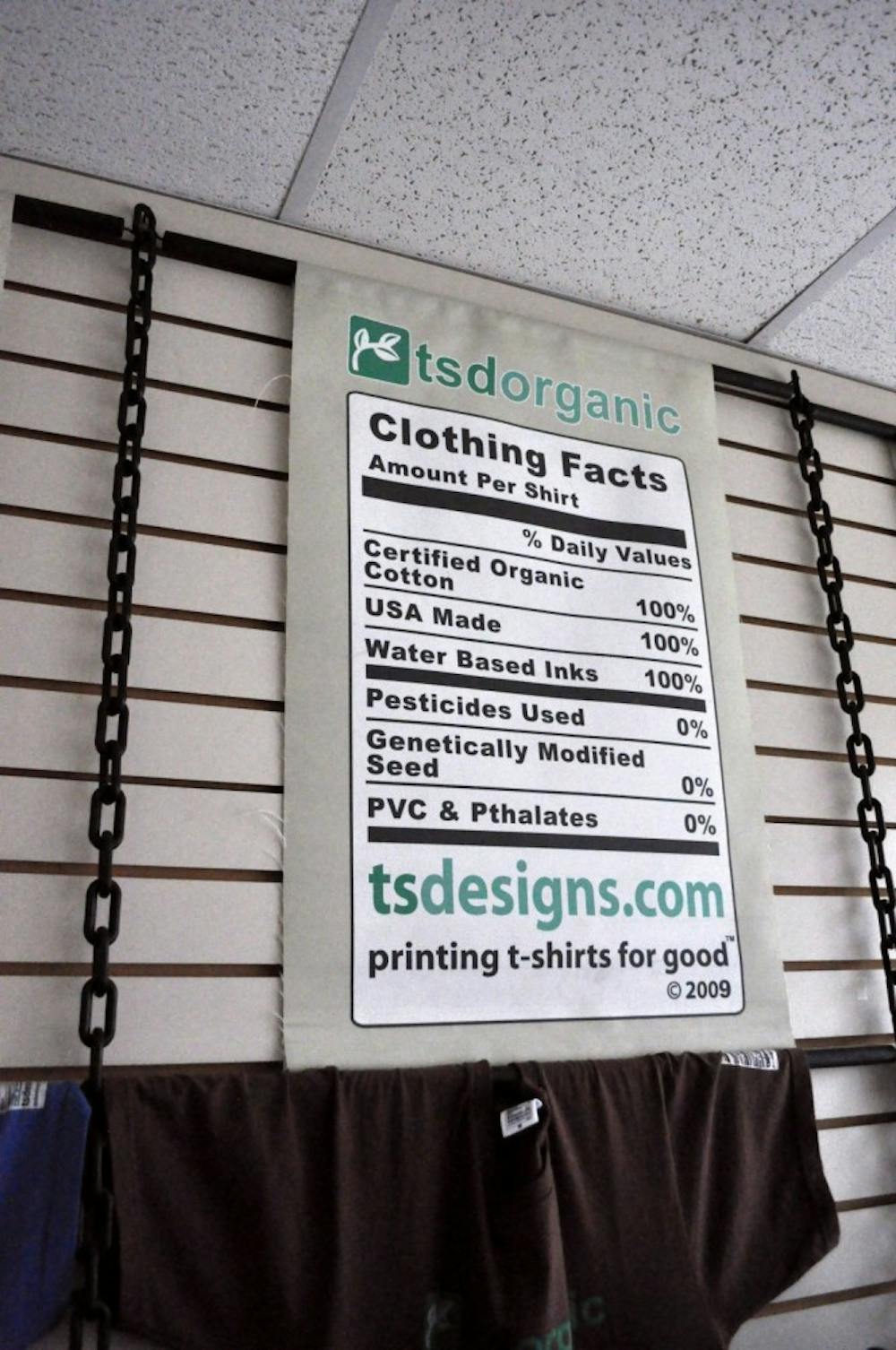It’s not often that T-shirts have a Clothing Facts box that resembles the Nutrition Facts label found on a box of snacks.
But TS Designs is not a normal clothing company.
Based in Burlington, TS Designs has taken on a commitment to sustainability. The company was founded by current CEO Tom Sineath in 1977 when it began printing shirts for big brands such as Nike, Tommy Hilfiger and The Gap until the implementation of the North American Free Trade Agreement in 1993, when the companies went overseas.
The employee count went from about 100 to 14, which was when Sineath and current president Eric Henry found a new way of doing things.
“(Their friend Sam Moore) introduced the idea of a triple bottom line for a sustainable business model,” Henry said. “Fortunately, we had the components already in place. For whatever reason, I can’t tie it to one particular thing, but I’ve always been concerned, interested in minimizing our impact on the environment.”
Known in shorthand as People, Planet and Profit, the “triple bottom line” led to some completely different ways of making T-shirts. One of those was called Cotton in the Carolinas. TS Designs buys cotton from a farm in New London, brings it to their factory, dyes it and through an environmentally-friendly process, sinks the desired ink into the shirt. Instead of using industry-standard plastisol, which emits dioxins and can cause negative health effects, the company uses a specially-mixed, super low-impact water-based ink.
Henry and the rest of the TS Designs crew are focused on transparency. On the Cotton in the Carolinas shirts, clothing facts are included.
“When you get a Cotton in the Carolinas T-shirt, you can look at the label, tell what year the harvest was, go to the website, look at the supply chain, connect via phone number, email, physical address — you get all the information,” Henry said.
Henry said he is concerned first and foremost with the sustainability aspect of TS Designs, a facet that he said makes the company stand out from many others in the same industry.
“What we want to do at TS Designs, we don’t want to just talk about sustainability, we want to demonstrate it,” he said. “We’ve got wind, we’ve got solar, we make biodiesel, we’ve got a garden, we’ve got chickens, we’ve got our T-shirts, we’ve got our printing process.”
In the backyard of the TS Designs factory and offices in Burlington, a community garden grows veggetables such as garlic, collard greens and cabbage. They even have a pen full of chickens roaming in a gated area.
“A lot of times, I tell people that we print T-shirts, and we have chickens in the back and we have a community garden,” said Lydia Paylor, who is in charge of logistics and sales support. “It’s good because it helps the employees in return go out and help out in the garden and help out with the chickens. I couldn’t tell you the last time I bought eggs from the grocery store because the chickens produce so many eggs. With the garden, when we start reaping in and harvesting everything, you don’t have to buy the vegetables at the store.”
During the summer, employees will take vegetables and other foods grown in the garden and make a company-wide meal.
“Each employee will pick a vegetable or whatever and make something out of it,” said Vice President of Sales Cristie Holland. “And then we share the recipes. It really has become something we look forward to and we share and enjoy it together.”
The community aspect within TS Designs is something that is attractive to Paylor.
“Everybody’s very friendly, family-oriented,” she said. “Everybody knows everybody’s children and grandkids and moms and dads. Everybody’s really good and relaxed.”
The employees also recognize the importance of the sustainable methods the company uses.
“What we do is make a better product,” Holland said. “Whatever your price point is, we can give you a better product, environmentally or socially.”
According to Henry, sustainability has attracted customers. Among local businesses that wear TS Designs are Zack’s Hot Dogs, Company Shops in Burlington and the Acorn Coffee Shop in Elon.
“People want it on their shirts because it demonstrates that, by having that on your shirt, that’s the mark of having the most sustainable T-shirt the market can offer,” Henry says. “Especially companies like (those), they’re trying to be a part of this sustainable movement. They want their customers to know that, and the quickest way to do it is to put it on their shirt.”
That is where the Clothing Facts come in. Henry said TS Designs is looking into replacing it with a QR code, but emphasizes the necessity of letting people know the company’s stance on being green.
“As we look at sustainability, it’s a journey, not a destination,” he said. “And we’ve been on that journey since the late ’90s to be a more sustainable company because when you fast forward to today and you see what’s happening in the economy, in the environment, we’re just not going to fix the environment by growing the economy. I believe we’re in the middle of a big shift and a shift to a more localized, more sustainable economy"


